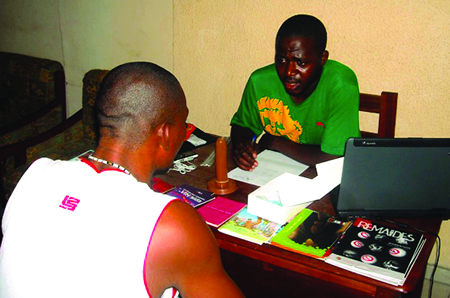GMT Grantee Profile
Alternatives-Cameroun (Douala, Cameroon)
Offering comprehensive wellness programming in a challenging environment
Download PDF version of this article
Strategies
- Establishing strong, savvy community leadership
- Providing comprehensive wellness programs
- Developing programs that reach MSM where they are—online, at home, in clubs
- Cultivating civil society allies
In 2005–06, 11 men from Douala were imprisoned for more than 12 months. Their crime: having gone to a nightclub known to be frequented by homosexuals, and not having enough money to bribe the police. After intense local and international pressure, the acquittal of these 11 men became a watershed event for MSM in Cameroon, galvanizing activists to scale up activities aimed at reducing the spread and impact of HIV among MSM.
Alternatives-Cameroun is a beacon of hope for MSM in a country where extortion and police harassment of MSM are still quite common. Led by a team of professionals (among them doctors, lawyers, media practitioners, and other healthcare providers) who are also activists, Alternatives has developed a comprehensive wellness model for meeting the HIV-related needs of MSM.

An Alternatives Access Centre colleague conducting a behavior change communication session with a client (Photo: Alternatives) |
The core of Alternatives’ programming is the Access Centre—a wellness center for MSM that offers primary healthcare services and referrals, and hosts discussions, debates, and support groups. Along with basic services, the center provides a safe space for MSM to feel valued and find a sense of community. Through an outreach program to various health centers and civil society partners, the Access Centre offers a referral network to assist MSM in securing much-needed help with legal support and vocational training.
In addition to traditional street and bar outreach, Alternatives-Cameroun utilizes culturally specific approaches to inform, empower, and motivate hidden MSM. Uniquely, the organization has adopted an old West African tradition known as Grins to make contact with MSM who might not be reached through lesbian, gay, bisexual and transgender (LGBT) venues. A Grins is a collective of men who gather for social support in a member’s home. Alternatives set up numerous Grins throughout Douala, training leaders to offer HIV risk reduction information as well as referral to its Access Center.
Additionally, Alternatives recognized the need to make contact with men online through sexual networking websites. “Clearly, MSM are meeting each other online and making connections for sex—it is only right that we be there to inform and empower them to play safe,” says Steave Nemande, president of Alternatives-Cameroun. The organization now trains online peer educators to surf various websites used by MSM in Cameroon, befriending and informing men about HIV risk reduction strategies and offering social support in an anonymous manner. This Internet outreach has produced an increase in the uptake of Alternatives’ primary health services.
The growth and success of Alternatives-Cameroun has led to increased support from other civil society organizations, primarily in the health and legal sectors. The help of their allies has encouraged the group to move forward with plans to more forcefully advocate the decriminalization of same-sex behavior.
The comprehensive nature of their program (outreach, education, social support, and healthcare services and referrals) has had a measurable impact on the health and well-being of MSM in Douala. In light of their success, Alternatives is expanding its reach throughout Cameroon and is making plans to work with MSM communities in Yaoundé and Buea.
In their own words
"Nicholas" is a client of Alternatives-Cameroun.
“I am a 26-year-old IT specialist, one of six children. I was imprisoned for a year because of my sexual identity. After being freed from prison, I learned about Alternatives through friends who encouraged me to become involved. I won’t share all the details of my imprisonment, except to say that I suffered deeply. I was very lonely and isolated. Nothing like Alternatives existed before. The program brought me together with other men like myself who supported each other. It taught me about my sexuality and, more importantly, about the risk of being infected with HIV and how to prevent that. Another motivation was receiving free condoms, which are very expensive at the drugstore.”